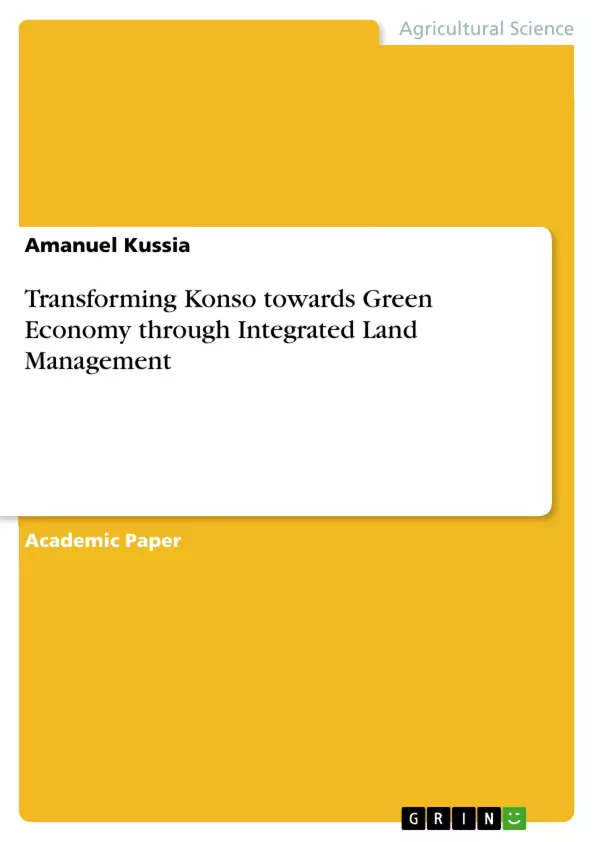This article examines the drivers, pressures, and impacts of land degradation on the ecosystem services and livelihood of the Konso people. To deal with the problem of land degradation, the People of Konso have been practicing well organized and innovative adaptation strategies in the form of indigenous soil and water conservation. The people are well known for their indigenous knowledge and skills of land management. Particularly, the antique and beautiful terraces, traditional agro forestry practices, and efficient irrigation methods are the prominent features of the Konso agricultural system. The people have been a model for the global community and their cultural landscape was registered by the UNESCO as one of the world’s heritage sites. The indigenous soil and water conservation practices have enabled the community to manage and live in a callous natural environment. However, these practices are now under the threat due to multiple factors which requires the attention of all stakeholders, principally of the Konso people (that is primarily responsible to maintain its identity of soil and water conservation).
Inhaltsverzeichnis (Table of Contents)
- Introduction
- A Brief Background about Konso Woreda
- A Brief Literature Review
- Definition of Key Concepts
- Land
- Land Degradation
- Major Cause of Land Degradation
- Impact of Land Degradation
- Conceptual Framework
- What are the Drivers of Land Degradation in Konso?
- What are the Pressures that Cause Land Degradation in Konso?
- State of Quality of Land Resource in Konso
- What are the Impacts of Land Degradation in Konso?
- What Is Being Done and How Effective Is It?
- Where is the Woreda Heading? (Conclusion)
- What Actions Could Be Taken for a More Sustainable Future? (Recommendations)
Zielsetzung und Themenschwerpunkte (Objectives and Key Themes)
This article investigates the various factors contributing to land degradation in the Konso region of Ethiopia, emphasizing the impact on both the ecosystem and the livelihoods of the Konso people. The article also examines the indigenous soil and water conservation practices employed by the Konso community, highlighting their effectiveness in managing land resources and mitigating the consequences of land degradation.
- Drivers and pressures of land degradation in Konso
- Impact of land degradation on ecosystem services and livelihoods
- Indigenous soil and water conservation practices in Konso
- The effectiveness of traditional land management strategies
- Challenges to traditional practices and the need for sustainable solutions
Zusammenfassung der Kapitel (Chapter Summaries)
The article begins with an introduction to the Konso Woreda, a region in Ethiopia known for its unique cultural heritage and innovative land management practices. It then delves into the definition of key concepts such as land degradation and explores the major causes and impacts of land degradation in Konso. The article examines the drivers and pressures contributing to land degradation, including population growth, high demand for land resources, poverty, and climate change.
The article goes on to discuss the impact of land degradation on various aspects of the Konso people's lives, including their physical assets, financial assets, natural assets, human capital, and social capital. It also provides insight into the indigenous soil and water conservation practices employed by the Konso community, exploring their effectiveness in managing land resources and mitigating the consequences of land degradation.
Schlüsselwörter (Keywords)
Land degradation, Konso, Ethiopia, ecosystem services, livelihoods, indigenous soil and water conservation, traditional land management, sustainable solutions, drivers, pressures, impacts, cultural heritage, UNESCO.
- Arbeit zitieren
- Amanuel Kussia (Autor:in), 2018, Transforming Konso towards Green Economy through Integrated Land Management, München, GRIN Verlag, https://www.hausarbeiten.de/document/437812


